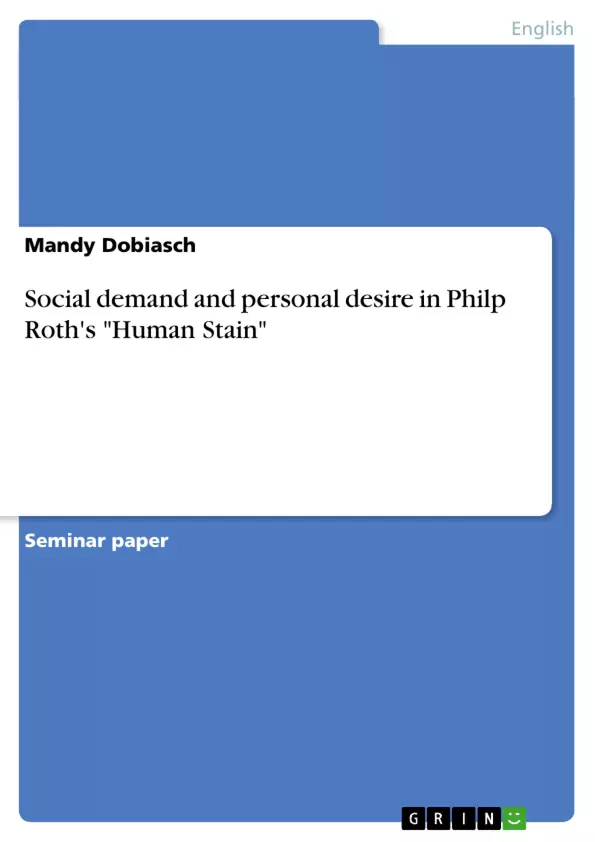We live in a time in which conformity and adaptation are important constituents of social life. Integration into society and the obeying of established norms, which goes hand in hand with it, are often the precondition for the degree of acceptance and the recognition of the individual in society. This, however, means that forms of expression of personal nature, including ethnic, religious as well as general questions concerning the personal belief, have to be practiced in private or in secret, or even have to be completely suppressed because the stigma of being antisocial or immoral is quickly allocated.
Especially when it comes to moral centrals issues, such as different opinions and individual actions which are directed at the public morals, these are often not accepted or even fought against. The freedom of the individual therefore too often drowns in the swamp of generality.
Philip Roth has tackled this problematic issue in his novel “The Human Stain”. The main character, Coleman Silk, is badly criticised by the people around him for making a thoughtless comment on two of his students, and in his anger uses this as an opportunity to evade social grading once and for all; he decides only to pursue the fulfilment of his desires and ideas. But Coleman is not the only acting character in conflict with the expectations of the general majority. There is Faunia Farley, a cleaner at the local college, with whom Coleman fosters a secret love affair and who tries to escape from the brutal behaviour of her ex-husband. There is precisely that Lester Farley, the Vietnam veteran who cannot come to terms with his war memories and therefore is not able to return into society. Interesting is also Delphine Roux, the young and ambitious College professor, who sets in motion the conflict concerning the accusation of racism against Coleman. Finally, the character Nathan
Zuckerman should be mentioned, the author of the story who, in search for isolation, finds exactly the opposite.
Each of the characters mentioned above has to bear his own internal conflict which keeps them from integrating into society and leading a normal life in adaptation, in the in the safe close circle of moral.
Inhaltsverzeichnis (Table of Contents)
- Introduction
- Main Part: Analysis
- Coleman Silk
- Faunia Farley
- Lester Farley
- Delphine Roux
- Nathan Zuckerman
- Nelson Primus
- Conclusion
Zielsetzung und Themenschwerpunkte (Objectives and Key Themes)
This paper analyzes the motives of the individual characters in Philip Roth's "The Human Stain", exploring the reasons that make them outsiders and their conflicts with societal expectations. It examines the interpersonal relationships between the characters and the role of minor figures like Nelson Primus. The paper aims to understand how these characters grapple with the tension between social demand and personal desire, particularly in the context of racial identity, personal integrity, and societal norms.
- The struggle between individual freedom and societal expectations
- The impact of racial identity and its social implications
- The complexities of love, relationships, and the pursuit of personal happiness
- The consequences of past choices and the search for self-acceptance
- The role of personal integrity in navigating a complex and judgmental society
Zusammenfassung der Kapitel (Chapter Summaries)
The introduction sets the stage by discussing the societal pressures of conformity and adaptation, highlighting how individuals often suppress their true selves to gain acceptance. This theme is explored through the central character, Coleman Silk, who faces accusations of racism and ultimately chooses to escape societal judgment by embracing a life of personal fulfillment. The analysis section delves deeper into the individual characters, examining their motivations and struggles. The chapter on Coleman Silk explores his past experiences with racial prejudice, his decision to conceal his African American heritage, and the events that lead him to reject societal norms in favor of personal desire. The chapter on Faunia Farley discusses her tumultuous past and her relationship with Coleman, highlighting her own quest for freedom and escape from a painful past.
Schlüsselwörter (Keywords)
The key concepts explored in this paper include social demand, personal desire, racial identity, societal expectations, conformity, integrity, love, relationships, and the consequences of past choices. It examines the tension between individual freedom and societal pressures, particularly in the context of racial prejudice and the pursuit of self-acceptance.
Frequently Asked Questions
What is the central conflict in Philip Roth's "The Human Stain"?
The novel explores the tension between social demand (conformity to norms) and personal desire, centered on Coleman Silk's decision to hide his racial identity.
How does Coleman Silk deal with societal expectations?
After being accused of racism, Silk chooses to evade social grading by focusing solely on his own desires, rejecting the safe circle of public morality.
Who are the other main characters in conflict with society?
Characters include Faunia Farley, who seeks escape from her past, Lester Farley, a veteran unable to reintegrate, and the ambitious professor Delphine Roux.
What role does racial identity play in the novel?
Racial identity is a core theme, specifically the social implications of concealing one's African American heritage in a judgmental society.
What is the significance of Nathan Zuckerman?
Zuckerman is the author-character who, while seeking isolation, becomes the narrator of the complex interpersonal struggles within the story.
- Citar trabajo
- Mandy Dobiasch (Autor), 2003, Social demand and personal desire in Philp Roth's "Human Stain", Múnich, GRIN Verlag, https://www.grin.com/document/28133



